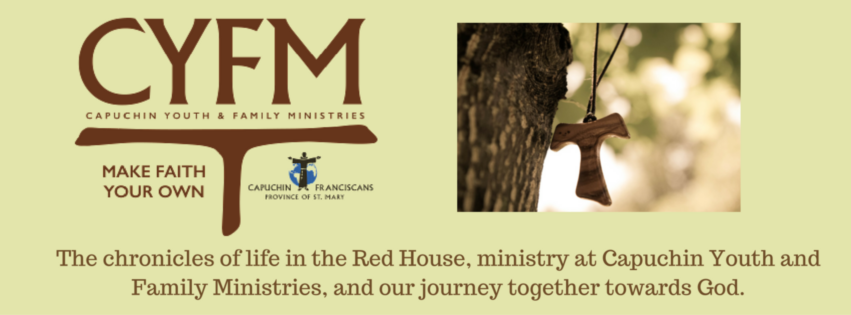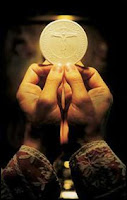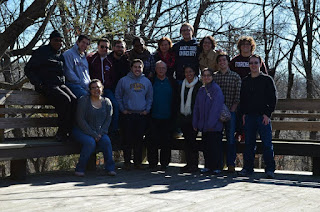While the first adventure occurred primarily in study and prayer, this second adventure happened out on the streets. God brought me to
people and places that would stretch me and teach me how to better live as His
servant. The places He would bring me, the things He would ask me to do were
things I never would have guessed when this discernment began. It was a
great adventure; in fact, it turned out to be an adventure across the world.
 |
Believe it or not, I used to
whittle on this very stoop... |
Believe it or not, I am by nature a homebody. I was one
of those strange kids who grew up in Maine and never talked about leaving. I
liked the cold, the lakes, the coast, the simple culture, just the fact it was
home. When I first started discerning, I assumed I would eventually become a
priest in the diocese of Portland. I could think of nothing better than
bringing Christ’s love, mercy and presence to a humble parish in Maine, to my home.
The idea of exploring strange and new places, having opportunities to do and
see things normal Mainers don’t was simply off my radar. It wouldn’t
happen. I was happy where I was at, I needed nothing more. I would live liked a
Mainer and die like a Mainer.
So when God dropped me in the Bronx, it was a bit
of shock to everybody.
 |
My mother and I exploring Fordham
during the college visit |
Don’t think that I exaggerate when I say that Providence
brought me to Fordham. On my own free will I never would have given the school
a second thought. My family was
travelling down the coast to Washington, D.C. where I was hoping to visit the
Catholic University of America. We stopped in New York City on the way and my
dad suggested I visit Fordham. I did it, but I did it to
humor him. I wasn’t interested in going to another Jesuit school. Four years of
raising objections in theology had made me a little leery of the Catholic
identity of Jesuit schools. But it made my dad happy, so we visited.
 |
My parents and I outside Duane Library
at Fordham. Notice how pleased
with himself my dad looks. |
By chance, we got a private tour of the school from a
philosophy major. By chance, I heard about their Honors Program (it was everything I'd ever dreamed of.) By chance I bumped into the
Italian parish down the street and knew I had a spiritual home. I applied. I
got in. By chance I got a full ride. By chance I got into the Honors Program.
But God knows that none of this was by chance.
So there I was. It was my sophomore year and the kid from
Maine who didn’t know how to pronounce the letter “r” was living off campus in
the Service Learning House. I would be living in a house with other kids from Fordham who were committed to doing
service and getting to know our neighbors in the Bronx. Unlike most of the university,we'd be living outside campus walls and we were supposed to be ambassadors of sorts between the community and the school. My first night there, I met one of my neighbors, but it was an encounter neither of us intended.
We never learned his name. None of us ever spoke with him. Around the house we called him "Dennis" after our Resident Director. Dennis was a homeless man who used to store his shopping
cart underneath my bedroom window. At about 7:00 or so in the evening, I’d hear
a cart crashing across the threshold of my backyard. He never did anything, but it was a little weird sitting at my desk with only a screen separating me from Dennis' face.
One night we actually staked out for him from the 2nd floor. "Joe, quick! Get the flashlight! I hear something." We got the flashlight alright. We were going to speak to Dennis about storing his shopping cart somewhere else. We beamed the flashlight down. There was a man there, but it wasn't Dennis: we'd caught our security guard taking a whiz on the side of the house. I wasn’t in Kansas anymore…
Beyond the Metal Detector
Part of living the house meant doing service, so for my service project that year, I would be volunteering as
a swim coach at the Theodore Roosevelt Educational Campus. Roosevelt was the public high
school right across the street from Fordham and it had a rough reputation. When Roosevelt
closed in 2006 to reopen as a bunch of smaller schools, their graduation rate
was at 3%. I discovered that reputation was earned when I had to go through a metal detector on my way to practice the first day.
God had a lot to teach me through that experience. My
swimmers referred to the fence that surrounds Fordham as “the force field.” According to them, by
some strange magic, the force field let white people in but all the black
people outside the gates seemed to bounce off. Inside the force field it was green and gothic. Outside people got shot. Ordinarily, the Bronx would have intimidated me and I would have stayed
safe on campus, behind the fence. But that wasn't enough for God.
It’s true, coming from
Maine
there was a huge cultural adjustment to coaching at a
Bronx
public school. Just speaking their language took me long enough. “Mister this
is type hard!” “Mister, I’m so brolic!” And then translating all the many
strange acronyms that popped up on their Facebook posts…A lot of them were from
immigrant families (actually, I think almost all were), whether from Puerto
Rico, Kosovo, Nigeria, or the Dominican Republic. And
they came from backgrounds that were sometimes tough for me to understand.
Their neighborhoods were often rough. I remember one of my
swimmers coming into practice late and describing how he’d spent his morning
running away from muggers. “Yo, mister, like, sorry I’m late. I was going to
Enes’ house when I saw these two guys coming towards me…I didn’t like the looks
of it, so I just booked it…you should have seen me, I was like woosh!...they followed me, but yeah, sorry I’m late.” It was a different world.

God’s love has no boundaries and He wanted me to understand and live
that. It didn’t matter that these kids lived in often rough neighborhoods. God brought me there to serve them, to
bring His love and joy there, even if all I was doing was teaching them how to swim. My time
there was unbelievably rewarding. I saw my swimmers grow as athletes and as
people, becoming more disciplined and more responsible as the years went on. I
volunteered to coach there for three years. I saw a lot of them graduate and go
on to things that I’m proud of them for. Some of them continued to swim when they went to college, others buckled down on their studies. My lesson was
learned: even beyond the metal detector, those were people worth serving. God's love had no boundaries. It didn't matter where they were, if there were souls to be served He wanted me there.
Praying for Women and Children
 |
| At the March for Life in DC, January 2010 |
The Bronx held even more adventures for me. By
chance (although I knew by then that God doesn’t usually play with chance), I
got involved with the Respect for Life club at Fordham. During a club fair, someone called out to me, "Hey! Are you pro-life?" I thought a moment, said yes and put my email on their list. Within two weeks, I
went from being a nominal but lukewarm pro-lifer to standing on the sidewalk outside
a South Bronx abortion clinic praying for the broken women walking past who
felt they had no choice but to end the life of their child.
 |
Praying outside Dr. Emily's abortion clinic
in the South Bronx |
Was I intimidated?
Oh yeah…It’s amazing how much ire a quiet lap around the rosary can raise, and
not from the women we were praying for either. Counter protestors and abortion clinic escorts would
taunt us, swear at us and at one point I even got spit at….(he missed.) Again,
God’s lesson for me was the same: His love has no boundaries. No matter how
dark the situation, God’s love penetrated even there.
Outside that clinic, I saw miracles. I’ll never forget
seeing a woman practically turn in midair when she heard one of the sidewalk
counselors say, “Mommy, I have help for you.” She ran into Heather’s arms
crying, telling her how she didn’t want to abort her baby, how her parents had
threatened to kick her out of the house if she didn’t do it, how she felt like she didn't have a choice. The fact that someone was willing to help her changed everything.
Another time, as I
prayed the rosary one morning, I saw a young guy my age coming out of the clinic.
By some grace of God, I could tell he wasn’t doing well. I didn’t know why, but
I felt like I needed to run across the street, give him a hug and tell him it
was going to be okay. I couldn’t, so I just started praying intensely for him,
asking Mary to be a mother to him since he needed one so much right then. I thought maybe I was imagining things, but prayers couldn't hurt. I later found out I wasn't. A sidewalk counselor said he’d talked to
the young man: his girlfriend was in that clinic and he wanted to keep the baby. His baby was about to die and there was nothing he could do about it. I
can only trust that Our Lady was there for him because in a dark time like
that, it seemed that no one else was.
 |
| Fordham Respect for Life praying for women and children! |
God brought me to dark and messy situations, places that
ordinarily I would have been afraid to be in. But He called me there to show me
that His love has no bounds, that my love
should have no bounds, that wherever He was suffering in the poor and unwanted,
there He was calling me.
If the Bronx was outside my comfort zone, you can imagine
what Calcutta was like.
To Calcutta with Mother Teresa
I had had a deep devotion to Mother Teresa for years. In
my desperate search as a freshman in high school to understand who Christ was,
I picked a book by Mother Teresa called No Greater Love. It challenged
me deeply, made me rethink what it meant to live as a Catholic, and inspired me
to want to love Christ and His poor with the depth of love Mother Teresa did. For
a moment, I wanted nothing more than to join the Missionaries of Charity, to be
radically poor like they were and to serve the poorest of the poor. But I couldn’t
do that. I was a kid from Maine. People from Maine didn’t do great things
like that.
So when I found out that Fordham had a Global Outreach
trip to Calcutta to work with the Missionaries of Charity for two weeks, at
first I thought it was too good to be true. For a moment I spun my wheels
saying it was too expensive for me, but next to what I had considered spending
on a semester abroad, it was a drop in the bucket. I applied. I got in. On New
Year’s Day that January I was in New York City getting ready to fly out to
Calcutta, India.
 |
A cow in the Calcutta streets: after
a week without meat I could have eaten
this thing raw. |
Once again, God had a lot of lessons and a lot of
adventure in store for me. I thought having lived in the Bronx I knew what a rough
city looked like. Calcutta was rough on a whole other level. People literally
almost dragged me to the ground, hanging on my arm calling, “Uncle! Money!” Not only did you have to watch your pocket, you also had to watch where you stepped because you were liable to trip over someone
sleeping on the sidewalk. And if you thought NYC traffic was bad, Calcutta
traffic had no rules. My life flashed before my eyes just getting into one of those
Tuk-Tuks.
God had lessons waiting for me here, but this time the
lesson went a little deeper. God was still teaching me that His love had no
bounds, that His light would shine in even the darkest places and that He was
calling me to carry it there. But this time it became more personal: my
response to His love should have no bounds. There should be no limits on what I was willing to give out of love.
 |
| Fordham volunteers lining up to serve lunch at Prem Dan |
My limits were stretched. I may not have been fluent in
Bronx, but I could get by. I knew nothing of Bengali. I didn’t know how to care
for the people in front of me and my only means of finding out what they needed was sign
language. Even that was tough, because since Indians eat with their hands, their signal for “Food!” looked to me
like they needed to take their medicine...
Often caring for them meant looking past things
that would normally turn my stomach. Rubbing lotion on residents doesn't sound like a big deal, but
amputated limbs could get dry too. And helping the handicapped get to the bathroom
was not a skill of mine, but when Sister was too busy they’d take anybody. They
weren’t all comfortable situations, but with each failure I had to pick myself
up, learn from it and keep giving.
 |
| Me and my friend Steve during chai break |
I wasn’t a particularly capable volunteer when got there, all plump,
healthy and happy from a restful Christmas break. When my health took a turn at
the end of the two weeks, I
really
wasn’t capable. Jesus called me to work anyhow and asked me to offer it all up
for the poor I worked with. As I hung up laundry, I worked through the pain and
offered it up. As I rubbed lotion on patients, I offered my pain in solidarity
with theirs. I worked until I couldn’t stay warm anymore. I waited until lunch
and then I left to go back to the school where my cot was waiting for me.
 |
| Prem Dan |
As the sickness grew worse, so too did Christ’s
insistence that I offer up all that pain out of love. He asked me to offer it in exchange for the
sufferings of the poor of Calcutta, in exchange for the spiritual struggles of
the people I volunteered with, in order to alleviate the burden of people who
needed it by voluntarily taking some of it onto myself. Through this I came to realize that giving all out of
love meant accepting physical suffering no matter where it would lead. If it meant giving my life for love, then so be it: if it was out of love, the benefits it would gain for other people were all
that mattered. It meant accepting spiritual desolation because at the time,
Christ’s joy seemed absent: if it was out of love, I could live the rest of my
life in that virtual hell, if only that pain were accepted in exchange for another person.
I let go of two things that I thought were
fundamentally important to me and came to understand a depth of Christ’s love
and His call for me that I had never before imagined. Not only was He calling
me to go anywhere no matter how dark or desolate, He was calling me to give
literally everything out of love for the souls in those places. I had to go to
the other side of the world to learn that lesson, but God in His Providence
made sure I did.
Thus ends my worldly adventure. More would follow. In fact I would circumnavigate the globe on pilgrimage before I entered the Jesuits, but that's a story for another time. One adventure remains left to describe: my vocational adventure. Check back in tomorrow for the final post!

 For those of you not familiar with this particular
character, Nancy Drew was a young teenage detective who had her own series of
mystery books. She was kind of like the female version of the Hardy Boys and in
fact, Frank and Joe Hardy make an appearance in her books. (Kelley has
commented multiple times on the ironic fact that despite the name, I’m much more like Frank than
Joe Hardy.) Sleuthing
around, searching for clues, catching bad guys red-handed, all while living the
life of an otherwise ordinary teenage girl: that is Nancy Drew.
For those of you not familiar with this particular
character, Nancy Drew was a young teenage detective who had her own series of
mystery books. She was kind of like the female version of the Hardy Boys and in
fact, Frank and Joe Hardy make an appearance in her books. (Kelley has
commented multiple times on the ironic fact that despite the name, I’m much more like Frank than
Joe Hardy.) Sleuthing
around, searching for clues, catching bad guys red-handed, all while living the
life of an otherwise ordinary teenage girl: that is Nancy Drew.













































